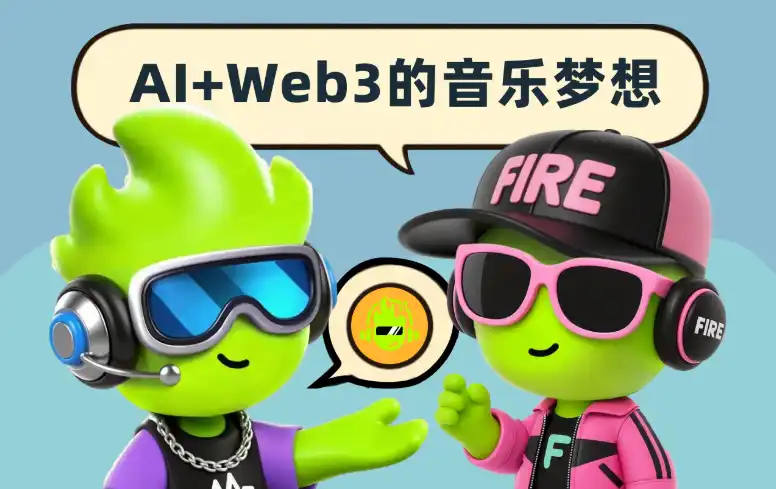Interview with the Fireverse Team: The AI+Web3 Music Dream
AI Music Platform Hatch by Mr. Stephen Chow as the First Creator's Nobody
With the rapid development of AI and blockchain technology, the music industry is experiencing an unprecedented wave of transformation. From AI-driven music generation tools like Suno and AIVA lowering the barrier to entry for music creation, to blockchain platforms like Audius and Opulous ensuring copyright protection and fair revenue distribution through decentralization, technology is reshaping the landscape of music creation and dissemination.
Following closely, Fireverse emerges as a breath of fresh air, introducing an innovative "AI+Web3" model. This AI music platform, incubated by Mr. Stephen Chow as the First Creator of Nobody, is unique—it enables ordinary people to easily create music, while safeguarding the rights of every creator through blockchain technology and enriching new gameplay. In simple terms, Fireverse aims to build a new world of music where "everyone can create, and every work has value." The platform also integrates with the Pi Group and the 9527 offline theater, embedding into film and offline scenarios; through partnerships with stars like Shirley Kwan and Anita Yuen, community events are held to ignite the passion of creators.

We interviewed Ignious Yong, a senior advisor at Fireverse, to explore how Fireverse uses technology and creativity as its engine to create a music utopia where "everyone can create, and creation is valuable," making music creation more free and fun.
Host: As a project incubated by Mr. Stephen Chow as the First Creator of Nobody, Fireverse has a unique brand DNA. The platform's vision is to build a new music ecosystem where "everyone can create, and creation is valuable." There must be deep thinking behind this concept. Could you share how the initial idea was conceived by the co-founding team? What unique perspectives have your personal experiences brought to Fireverse?
Ignious Yong: Before investing in and supporting Fireverse, Nobody pondered which track related to creators would stand out in the era of AI prevalence: we felt that AI-generated music, videos, and games had a high probability of becoming a highlight of the combination of Web3 and AI. When discussing the business logic with the Fireverse team, their innovative thinking about business expansion attracted us. Under the greatly reduced cost of music creation, more users can participate in music creation and profit from it. Combined with the dissemination power of the Web3 community, we believe this is the future of music creation, dissemination, and monetization.
As a project incubated by Nobody, Fireverse's DNA naturally integrates the innovative spirit of artist IP with the foresight of Web3 technology. Fireverse's vision — "Everyone can create, and creation is valuable" — stems from a deep insight into the pain points of the music industry: traditional music creation is monopolized by high barriers to entry in technology and resources, while Web2-era streaming platforms have failed to address the imbalance in creator revenue distribution. The emergence of Fireverse is precisely to use AI to lower the barrier to creation and to reshape value distribution with blockchain, allowing music to return to the essence of mass expression.
I myself am a music enthusiast and also very optimistic about the development of Web3+AI. I believe that this combination can attract more users to enter the Web3 field. I hope that here, everyone can freely create, distribute, and obtain deserved value through on-chain mechanisms.
Host: On a technical level, how does AI music generation technology lower the barrier to creation? How can ordinary users quickly create high-quality music through the platform?
Ignious Yong: Currently, the core creative method supported by the Fireverse platform is text-based music generation. Users do not need to understand music theory or instruments; they only need to input a textual description, and the AI engine will parse keywords in 3 seconds, automatically match rhythmic patterns, chord progressions, and sound libraries, generating a personalized music framework. It's like having a music producer who "understands human language."
For ordinary users, all they need to do is capture their inspiration fragments at any time, such as a line of poetry or text, a scene, or directly record ambient sound. AI will automatically transform it into musical elements, then make stylistic improvements and detailed refinements. Fireverse can help ordinary users start from scratch, significantly lowering the barrier to creation, and achieve a sense of creative accomplishment.
Fireverse's new Music GPT model is also about to be unveiled, with comprehensive upgrades in music structure, melodic logic, and stylistic diversity, making the generated music more aligned with human auditory aesthetics and emotional expression. In the future, we will gradually introduce more interactive methods such as hummed melody generation, melody + lyrics combination creation, etc., to continue expanding creative freedom.
After the Fireverse TGE, we will actively develop more distribution and promotion functions, allowing users to more quickly monetize their AI music creations. Additionally, for loyal users creating music on our platform, we will provide more rewards and support in the community to collaboratively contribute to ecosystem development.
Host: In the process of integrating AI with Web3 technology, what technical challenges did the team encounter? For example, in terms of data privacy, computing costs, or user experience? How did Fireverse overcome these obstacles?
Ignious Yong: Reflecting on the entire product development process, the team did face some challenges. The first point was computing costs. Initially, Fireverse used large models to generate music, resulting in high-quality music output but also significantly high computational costs. This created some pressure for us, but later, we shifted to a combination of lightweight models and algorithm compression. This approach reduced the computational costs by 80% while maintaining quality.
Regarding data privacy, the team also recognized a natural conflict between the transparency of blockchain and the sensitivity of AI data. For example, in the upcoming "Hum to Generate Music" feature, which will involve user audio data, there may be a potential risk of voiceprint information leakage. To address this, the team is exploring the integration of privacy protection technologies like ZK to ensure that users have stronger data protection when participating in future creative activities.
Host: There are already some music-related projects on the market, such as Audius, leveraging blockchain technology to slightly favor artists, and Sound using NFTs to represent music ownership. In your opinion, in what aspects is Fireverse more innovative compared to these projects, and what are its advantages?
Ignious Yong: A good ecosystem thrives on diversity, and we highly appreciate the exploration done by excellent platforms like Audius and Sound in the Web3 music space, as they have accumulated valuable experiences for the industry. Fireverse does not see them as "competitors"; instead, we hope to inspire each other and evolve together as peers. Just like Apple Music and Spotify coexist along with many other music software applications, we aim to make the entire industry ecosystem more prosperous.
One of the biggest differences between Fireverse and these two Web3+AI Music platforms, apart from the business model, is the richness of our resources. For example, artist IPs, entertainment industry resources, and other AI-generated content resources. Fireverse has already engaged in deep collaborations with many well-known stars and artists. Please stay tuned for the continuous development of our ecosystem, as Fireverse will soon announce more exciting updates.
Of course, from a product logic and vision perspective, Fireverse has a significant differentiation compared to them, mainly manifested in two aspects: the accessibility of AI-generated content and deep integration with Web3 applications. Simply put, besides AI music creation, the Fireverse platform will also unfold features for streaming and music monetization, allowing ordinary users to earn money through their creations on the platform. Additionally, top music artists can collaborate with their fans on our platform to create high-quality music together.
In other words, what Fireverse is attempting to build is a music platform that combines AI-empowered creation, Web3 on-chain monetization, and community-driven traffic. We hope that each piece of work will not only have melody but also value; each user is not just a listener but also a creator and participant, and everyone can profit on the platform.
Host: Indeed, AI has lowered the barriers for ordinary users to create, increased everyone's output capacity. Do you think this will make users overly reliant on tools, lose personalization, such as simply remixing existing music and infringing on the original creators' intellectual property?
Ignious Yong: This is a very insightful question, which is actually a topic we pay special attention to when designing the product, not only in the Web3 field but also in the Web2 domain, AI music faces the same questioning.
Actually, AI is about unleashing personal productivity rather than replacing human beings. AI is indeed a tool that can make people with very high creative abilities more efficient and can also enable music creation in a low-cost environment. So, Fireverse's platform needs to allow both ordinary users and professional users to unleash their creative abilities to a greater extent on this platform.
Host: Fireverse's AI and Web3 technologies have shown remarkable performance in generating and distributing music value. Could you share how the platform transforms entertainment industry resources into business opportunities? What are the considerations behind the ecosystem layout?
Ignious Yong: When the Fireverse team approached Nobody for collaboration, the Fireverse team valued Nobody's entertainment industry and artist resources. Additionally, as Nobody began incubating and investing in Fireverse, they proactively connected relevant resources and provided business model advice.
For example, collaborating with Hins Cheung on the "Time Trilogy": users participate in team PK through AI-generated songs, and the winning works are sung by Hins Cheung and distributed to users as rewards and royalties. This activity attracted a total of over 7 million users, generated 300,000 songs, and drove a 45% growth in platform users.
We have achieved a similar effect as with Carina Lau.
In addition, Fireverse is currently in discussions with BIG Group for more business collaborations. Please stay tuned for the development of our future ecosystem.
Host: Can Fireverse share any recent progress with us? According to official data, there have been over 500,000 pieces of music generated on the platform, and the music released by virtual idols has already accumulated over 4 million views on streaming platforms like YouTube, which is a remarkable achievement. What are the next steps in terms of technological iterations, listings, ecosystem expansion, or globalization?
Ignious Yong: To date, the Fireverse platform has generated over 500,000 AI creations, with a user base exceeding 16 million. The total views of its virtual idol content on platforms like YouTube have surpassed 4 million, establishing itself as a benchmark for Web3+AI music commercialization. It is also the largest AI music platform on the BNB CHAIN, confirming high user acceptance of the Fireverse platform.
In terms of technological iterations, Fireverse will enhance its AI creation capabilities, introduce AI composition and vocal training systems, and open up style customization models.
On the ecosystem front, Fireverse will further engage in artist IP collaborations and offline scene penetration to facilitate cross-element traffic and continue to capture market share.
Host: The combination of AI and web3 has demonstrated significant potential in Fireverse. In your opinion, what are some potential application scenarios for this technological fusion in other industries, such as film and television arts, medical data sharing, or financial services? How do you view the development trends of the AI and web3 integration in the next 5-10 years?
Ignious Yong: I believe that the fusion of AI and Web3 is one of the most revolutionary technological paths in the digital society of the next decade.
Many possibilities will emerge, and even I dare not predict them all. What is certain is that creators will face a massive technological revolution. The cost of creation will be greatly reduced, possibly by more than 90% of current costs. If future creators do not master the technology of AI-generated content, they will face obsolescence.
Likewise, creators who excel in both AI-generated content technology and creativity will reap significant benefits. If these creators also engage in the Web3 field, they can enrich the entire Web3 ecosystem, making the general public more willing to embrace Web3.
Host: Thank you for your insights. Finally, do you have any words of wisdom for music creators or community members who are interested in Fireverse?
Ignious Yong: Thank you all for your support and contributions to the Fireverse ecosystem. I hope that the Fireverse team can live up to everyone's expectations. Moreover, I know that the Fireverse team is preparing to announce some major partnerships shortly after the TGE, so please stay tuned.
Conclusion
This is not just a music revolution; Fireverse is transforming the very essence of creation. They use AI to enable ordinary people to create beautiful music, and through technological innovation, they empower every creator to flourish in a fair and transparent ecosystem. At Fireverse, technology is no longer cold but a warm enabler, helping you turn the melodies in your mind into reality. The road ahead is long, but Fireverse has taken a solid step forward. They are opening their doors wide, inviting everyone who loves music to join this captivating adventure. Whether you are a professional musician or a casual enthusiast, here you can find your own stage and write your music story.
Disclaimer: The content of this article solely reflects the author's opinion and does not represent the platform in any capacity. This article is not intended to serve as a reference for making investment decisions.
You may also like
Bitcoin due 2026 bottom as exchange volumes grind lower: Analysis

samczsun: The Key to Crypto Protocol Security Lies in Proactive Re-Auditing
Bug bounty programs are passive measures, while security protection requires proactive advancement.

Millennials with the most cryptocurrency holdings are reaching the peak of divorce, but the law is not yet prepared.
The biggest problem faced by most parties is that they have no idea their spouse holds cryptocurrency.

Using "zero fees" as a gimmick, is Lighter's actual cost 5–10 times higher?
What standard accounts receive from Lighter is not free trading, but rather slower transactions. This delay is turned into a source of profit by faster participants.

